| |
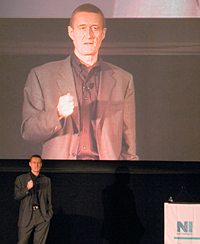 |
| |
Andy
Lock, executive vice president and chief administrative
officer at Herman Miller Inc., delivered a larger-than-life
keynote address. |
| |
|
Kellogg
hosts national Net Impact Conference
Student
leadership key to success of social entrepreneurship gala;
conference reveals how business can reduce poverty, environmental
crises
By
Aubrey Henretty and Ed Finkel
Photos
by Nathan Mandell
Ideas,
enthusiasm and an event brimming with entrepreneurial determination
to make a world of difference swept into Evanston Oct. 27-29
as the Kellogg School of Management hosted the 14th Annual
Net Impact Conference.
The
three-day event, the largest of its kind, is produced each
year by Net Impact, a national organization founded by MBA
students in 1993. Claiming a membership of some 10,000 "new
generation leaders committed to using the power of business
to improve the world," the group seeks ways to eradicate
various social ills, including poverty and environmental crises.
Helping advance the agenda for the 2006 summit were more than
150 Kellogg students from the school's Social
Impact Club who contributed their leadership in marketing,
logistics and curriculum — no small task, considering
the event's ambitious program.
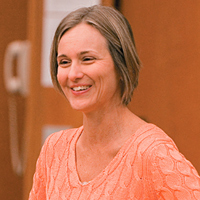 |
|
| Kellogg
alum Janet Froetscher '83 delivered a Sunday capstone
address at the Net Impact Conference. The President and
CEO of United Way of Metropolitan Chicago encouraged attendees
to consider a role in the private sector to build credibility
and contacts that they would find valuable once they made
the transition into the nonprofit world. |
|
| |
|
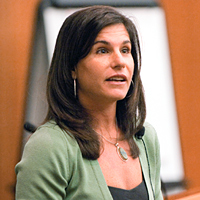 |
|
| Sheryl
O'Loughlin '94, CEO of Clif Bar & Co., shared the
challenges her company has faced trying to manufacture
a more environmentally friendly nutrition product. In
her Saturday capstone remarks she told the audience how
her firm abandoned shrink wrap, resulting in a significant
environmental benefit. |
|
| |
|
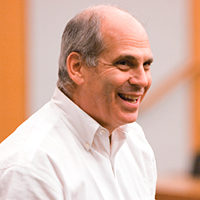 |
|
| In
his Saturday capstone address, Fast Company Co-Founder
Alan Webber said, "If you look at the landscape of
business, it's not difficult to see that the rules have
changed ... [and] the status quo is broken." |
|
| |
|
Net
Impact featured scores of panels, workshops, networking opportunities
and prominent speakers, including leaders from organizations
such as United Way, Herman Miller, Deloitte and Touche, Gap
Inc. and Clif Bar. Activities began Friday on Chicago's Navy
Pier with a keynote address by ACCION International CEO Maria
Otero.
Otero
spoke about microfinance's role in combating global poverty
and what she called the "moral imperative" for MBA
graduates to use their skills to improve society. The following
day brought the conference to the Kellogg School's Evanston
campus, where students sipped fair-trade coffee from biodegradable
paper cups as they dashed from the Donald P. Jacobs Center
to Cahn Auditorium to the James L. Allen Center and back again.
They set aside leftovers from organic lunches for composting
and dropped empty sugar packets into the helpfully labeled
recycling bins — all elements in practicing what attendees
were preaching as the sort of socially responsible actions
they hoped to see emulated.
As
participants reviewed their eco-friendly conference materials,
they did not complain about the wind. They lamented only one
thing: their inability to attend several events at once during
the action-packed weekend.
The
conference's return to Kellogg for the second time was the
fruit of more than a year's labor by the school's award-winning
Net Impact chapter, the Social Impact Club. Conference Marketing
Chair Ananda Baron '07 said the event's size —
and the many Kellogg students who volunteered to help organize
it — speaks to a sea change in the culture of business
education nationwide. "This shows a very strong trend,"
she said, noting that the conference sold out before early
registration concluded. "This is not a marketing conference,"
she said. "We're not giving away jobs or stock tips."
What
the conference did offer attendees were insights bound to
contribute to their professional success, said Tiffany
Brooks '07, conference design team chair:
"To be competitive in business, you have to think about
the environment ... from oil to green buildings to HIV/AIDS
in Africa — it's all relevant."
New
to the conference was the "Professional Summit,"
presentations and breakout sessions tailored to the interests
of socially minded leaders already in the field. Panel topics
included "The Business Case for Green Building"
and "Sustainable Product Development and Design."
The
conference's Saturday portion featured addresses by Deloitte
and Touche Managing Partner Barry Salzberg, Clif Bar
& Co. CEO Sheryl O'Loughlin '94, Room To Read Founder
John Wood '89 and Fast Company Founding Editor
Alan Webber.
Salzberg's
opening remarks were directed at the "millennials"
— the new generation of MBA students. "You are
a generation with more clout than perhaps you realize,"
he said, citing a recent study that found more than half of
MBAs in the "millennial" generation said they would
never work for a company that was not serious about changing
the world for the better. "So change it," he said.
"It's your world. Change it."
If
Salzberg made amelioration sound simple, O'Loughlin discussed
just how complicated it can be from the chief executive's
perch. The Clif Bar & Co. CEO demonstrated how something
as seemingly uncomplicated as producing organic energy bars
has far-reaching consequences. O'Loughlin recalled that her
company shrink-wrapped its products in plastic up until the
day an ecologist the company hired to evaluate its environmental
impact asked why: "And we said, 'Um, we don't know.'"
The company's decision to stop shrink-wrapping saved tens
of thousands of pounds of plastic, and O'Loughlin said she
and her team have continued questioning business-as-usual
ever since.
| |
|
| |
|
| |
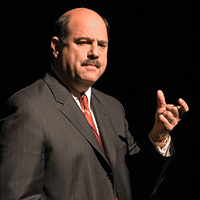 |
| |
"You
are a generation with more clout than perhaps you realize,"
said Deloitte and Touche Managing Partner Barry Salzberg
in his Saturday keynote. He cited figures that indicate
61 percent of young business leaders believe they are
"personally responsible for making the world a better
place." |
| |
|
| |
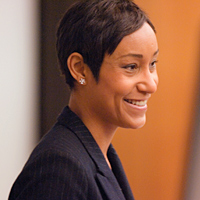 |
| |
Desiree
Rogers brought insights from her role as president of
Peoples Gas and North Shore Gas. "I must balance
my responsibility to my shareholders with society's needs,"
she told conference attendees during her capstone address. |
| |
|
| |
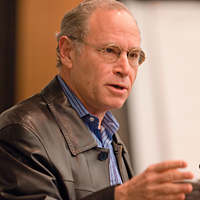 |
| |
Adjunct
Kellogg Professor Richard
Sandor provided fuel for thought during a capstone
speech that included references to his role as chairman
and CEO of the Chicago Climate Exchange, a multisector
marketplace that aims to reduce and trade greenhouse gas
emissions. |
| |
|
Room
To Read Founder John Wood '89 also found the status
quo lacking when he left his marketing job at Microsoft in
1999 to devote his life to building schools and libraries
for children in poor countries. "We are way over the
model of a bunch of well-meaning Westerners going in with
hardhats," he said, emphasizing the importance of community
cooperation and commitment to education. Room To Read has
helped build more than 3,300 bilingual libraries throughout
six poor Asian nations since its inception.
While
some attendees sat in on speaker presentations, others split
off into smaller groups for discussions. One popular breakout
session, "How to Start a Social Enterprise: a Case Study
of the One Acre Fund," focused on the phenomenal success
of the fast-growing, hunger-ending microfinance organization
and included One Acre Fund Founder Andrew Youn '06.
Joining him were Kellogg Professor Barry
Merkin as well as Ken Appenteng, head of microfinance
banking for Opportunity International in Malawi, and Paul
Christensen, president of ShoreCap International.
Afterwards,
Youn, who flew to Evanston from Africa especially for the
conference, said: "The panel showcased that One Acre
Fund is truly a Kellogg affair. Professor Merkin incubated
our business plan in his class, and continues to spread the
word with key people. Larry Levy ['67] has provided
One Acre Fund with advice and financial support through his
entrepreneurship center on campus. Matt Forti ['06],
our board chair, led the drive to get more than 100 Kellogg
students in the Class of 2006 to become monthly contributors."
The
conference concluded Sunday with additional speakers, including
United Way of Chicago CEO Janet Froetscher '83, Kellogg
Adjunct Professor and CEO of Chicago Climate Exchange Richard
Sandor, and Peoples Gas President Desiree Rogers.
Froetscher
noted how a professional start in the private sector builds
credibility and contacts in a world that nonprofit execs need
to tap for resources in an era of reduced government spending
on social programs. As recently as 10 years ago, nonprofits
tended to question the motives of those entering their world
after working in the for-profit sector, but some of that suspicion
has fallen away, she said.
"The
sources of funds for nonprofits are really diminishing,"
said Froetscher. "They're looking for business to engage
more. They're looking [to hire] someone who has played in
that world."
Rogers
said she must measure a double bottom line as president of
People's Gas, a role she said provides operational and public
relations challenges in an era of wildly fluctuating energy
costs. "I must balance my responsibility to my shareholders
with society's needs," she said. "We're seeing [energy
prices] become much more of a populist issue."
The
price of gas may have risen in recent years, but clean air
and water are going to be the most valuable commodities in
the years to come, said Sandor, who's known as the "father
of financial futures" for his pioneering work in the
1970s to create interest rate futures.
"We
are, simply speaking, living in a decade and time where the
scarcest resources ... are in the environment we live in,"
he said during his Sunday capstone address.
For
example, the incentives to bring sulfur emissions below EPA
targets easily cost-justify the equipment needed to do so,
and carbon emissions are headed down that path, Sandor said.
"The sulfur crop in America is bigger than the wheat
crop," he said, adding that carbon "will be the
largest [emissions trading] market in the world – not
even anything close."
Though
students and presenters alike expressed hope for the future,
the weekend's idealism was tempered by an awareness of the
hurdles facing leaders willing to create a better world.
Webber
observed that social change necessarily "starts with
looking the brutal facts of life in the eye and admitting
that the status quo is broken." Wood invited conference
attendees to have a look at the front page of any newspaper
for a glimpse at the world's many dark realities, but he urged
them to stand firm.
"It's
up to all of us to shine a light on that darkness," said
Wood. "The world is a scary place today. But we cannot
give up."
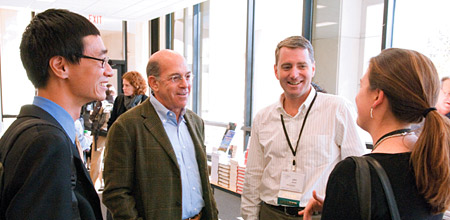 |
| The
collective entrepreneurial power at the Net Impact Conference
was impressive. Here, Kellogg alumni (from left) Andrew
Youn '06, Larry Levy '67 and John Wood '89 interact with
Sandra Anderson '07. At the event, the graduates all participated
in capstone addresses or panel discussions. |
|





